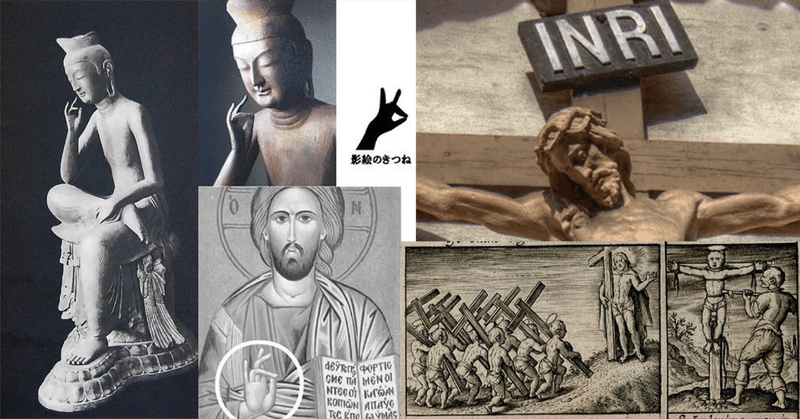
「稲荷」=Inari="INRI".
This article was written for Westerners who are aware of the problems with this type of form. This is a well-known mystery in Japan. I added the missing parts to the English text that had been in existence for some time.
西洋人でこの手の形の問題に気づいている人ように、書いた記事です。これは日本では有名な謎。前々からあった英文に足りないところを書き足した。
In Japan, there is something called the game of shadow painting.
日本には、影絵の遊びというものがあります。

The pose of Jesus' hand is the same as that of the statue of 弥勒菩薩(Maitreya) at Koryuji.
弥勒菩薩=Sanskrit:maitreya
パーリ=Pali:metteyya
この手の形は、狐の影絵になるポーズです。
This hand shape is a shadowy pose of a fox.

神道には狐の神社がある。稲荷神社という。
Shinto has a shrine for foxes. It is called Inari(稲荷 )Shrine.


狐だけでなく、赤い鳥居で有名。
Famous not only for its foxes but also for its red torii gate.


We know that the torii is the entrance to an ancient Jewish home.
鳥居は古代ユダヤ人の家の入口だということは、分かっている。



'Inari' means 'fox'. It's a shrine for the fox god, explains the Japanese state, but neither this kanji nor its pronunciation means anything like that.
「稲荷」は狐のことですよ。狐の神様の神社なのですよ、と、日本国は説明するのだが、この漢字も発音もそのような意味ではない。
In Japan there is a food called inari. It is a type of sushi.
日本には稲荷という食べ物がある。寿司の一種である。

稲荷寿司は、甘辛く煮た油揚げの中に、酢飯を詰めた寿司の一種。「お稲荷さん」「お稲荷」「いなり」などとも呼ばれる。
稲荷寿司(Inari sushi )is a type of sushi consisting of sweet and spicy fried tofu stuffed with vinegared rice. Also known as 'oinari-san', 'oinari' or 'inari'.
御 = o = attached to a noun, expressing respect. Words. Close to English Lord.
御=o= 名詞に付いて、尊敬の意を表す。言葉。英語の主に近い。
This food has its roots in the Inari shrine. It is explained that this food was intended as an offering to the Inari shrine, as the fox's favourite food is fried tofu.
この食べ物のルーツは稲荷神社。狐の好物は油揚げなので、お稲荷さまにお供えするための食べ物だったと説明されている。
You can find out by examining the foxes. Fried tofu is not a favourite food of foxes. If you give it to them, they will eat it, but it is not their favourite food.
キツネを調べればわかることです。油揚げはキツネの好物ではありません。与えれば食べますが、好物ではありません。

They made up a new food to fool the Japanese goyim public. In the first place, foxes are not called inari in Japanese.
日本のゴイムの大衆を騙すために、新しい食べ物作ったんだ。そもそも日本語で狐の事を、稲荷などとは言わない。
This is perfectly understandable: "Inari" in the Japanese Inari shrine is "INRI".
これは完全に理解できる。日本の稲荷神社の "稲荷 "は "INRI "です。
※「稲荷」=Inari
It's been said in Urban legend for a long time. I laughed at it as a funny joke, but after some research I found out that it is 'INRI' for Jesus of Nazareth.
前々からUrban legendでは言われていたんだ。面白い冗談だなと笑っていたが、調べた結果、これはナザレのイエスの「INRI 」なのです。
Inari Shrine is known to bring immediately worshipers bad luck.
It would be interesting to search for the voices of the general public in Japanese.
稲荷神社は、参拝すると不幸が訪れることで知られている。

INRI" is an acronym for "Inari," the name given to the cross of Jesus Christ,
'IESVS NAZARENVS REX IVDAEORVM' in Latin. In Japan,it is translated as "Jesus of Nazareth, King of the Jews.
「INRI」は、ラテン語で「IESVS NAZARENVS REX IVDAEORVM」というイエス・キリストの十字架に付けられた名前「イナリ」の頭文字を取ったものです。日本では「ユダヤの王、ナザレのイエス」と訳されている。

ישוע הנצרי ומלך היהודים
trancelated "Jesus the Nazarene and King of the Jews "
訳「ナザレ人イエスはユダヤの王である」
Decode these initials…
ישוע הנצרי ומלך היהודים(Yeshua` haNotzri u'Melech haYehudim)is "Jesus the Nazarene and King of the Jews "
Although,It's a subtle distortion.…
These intials can read "יהוה, YHWH "…………(;´Д`A
⭕️"Jesus = Yahweh"


ישוע הנצרי ומלך היהודים "Jesus the Nazarene and King of the Jews "
=
יהוה (Yahweh)
IESVS NAZARENVS REX IVDAEORVM
("Jesus the Nazarene and King of the Jews ")
=
INRI(稲荷)
(The omitted middle line is Greek.)

⭕️Jesus = Yahweh = Inari?(;´Д`A
There are people groaning about what this means, and discussion charts are lying around on the web.




The Japanese word "Jesus Christ" is "yeshua Hamashiach" in Hebrew.
The word "masiach"means Messiah Christ, is "The anointed one"

Meaning of Jesus Christ, Son of God = "yeshua Hamashiach"
They have all the meanings of "King, priest, prophet"
神の子イエス・キリストの意味=「イシュア・ハマシヤハ」王、祭司、預言者のすべての意味を持つ。

"King, priest, prophet"So does the emperor(Shinto),right?
「王、神官、預言者」天皇(神道)もそうでしょう?
END
この記事が気に入ったらサポートをしてみませんか?
